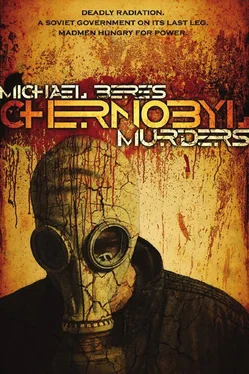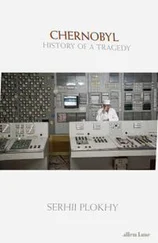Michael Beres - Chernobyl Murders
Здесь есть возможность читать онлайн «Michael Beres - Chernobyl Murders» весь текст электронной книги совершенно бесплатно (целиком полную версию без сокращений). В некоторых случаях можно слушать аудио, скачать через торрент в формате fb2 и присутствует краткое содержание. Жанр: Триллер, на английском языке. Описание произведения, (предисловие) а так же отзывы посетителей доступны на портале библиотеки ЛибКат.
- Название:Chernobyl Murders
- Автор:
- Жанр:
- Год:неизвестен
- ISBN:нет данных
- Рейтинг книги:4 / 5. Голосов: 1
-
Избранное:Добавить в избранное
- Отзывы:
-
Ваша оценка:
- 80
- 1
- 2
- 3
- 4
- 5
Chernobyl Murders: краткое содержание, описание и аннотация
Предлагаем к чтению аннотацию, описание, краткое содержание или предисловие (зависит от того, что написал сам автор книги «Chernobyl Murders»). Если вы не нашли необходимую информацию о книге — напишите в комментариях, мы постараемся отыскать её.
Chernobyl Murders — читать онлайн бесплатно полную книгу (весь текст) целиком
Ниже представлен текст книги, разбитый по страницам. Система сохранения места последней прочитанной страницы, позволяет с удобством читать онлайн бесплатно книгу «Chernobyl Murders», без необходимости каждый раз заново искать на чём Вы остановились. Поставьте закладку, и сможете в любой момент перейти на страницу, на которой закончили чтение.
Интервал:
Закладка:
Mihaly stood in the shaft of light from the entrance, fastening a button on his shorts. He spoke in Hungarian. “I can’t see a damn thing after being out there. The heat is unbearable. I don’t see how Nina and the girls can stand it in the house. I thought they’d be in the yard.” Mihaly shaded his eyes with his hand. “Laz? Are you here?”
“I dozed off for a moment.”
“It’s the wine,” said Mihaly. “All these beautiful barrels of wine.”
Mihaly did what looked like a quick czardas step, which raised dust on the dirt floor. “This holiday should go on forever.”
“If we keep drinking like this, we’ll be minus our livers,” said Lazlo.
“We hardly drank yesterday when Cousin Andrew was here. He and his wife and their bottled water.” Mihaly ran in place, raising more dust. “We’ll burn off the alcohol. How about a run, Laz? We’ll become health-conscious like our American cousin. And when we come back, we’ll down a keg before dinner.”
“You run if you like. You’re younger.”
Mihaly stooped down, began retying the laces on his red sneakers. “What do a few years mean, Laz? You’re only forty-one.”
“Forty-three. I’m older than my gun.”
“What does your gun have to do with it?”
“It’s a scratched and worn antique from the fifties only a gun collector could love.”
“Okay, so you’re forty-three. Lots of rock stars swooned over by teenaged girls are in their forties. What’s important is how you project yourself to others.”
Lazlo stared at Mihaly’s sneakers. “Do red shoes make you feel younger?”
“Of course,” said Mihaly. “If I wore them to work, my boss would bleed from his eyes. He’s the one who made the engineers get their Party cards. The bastard is always lecturing, using worn-out phrases like saying our mother’s milk hasn’t dried on our lips.”
Mihaly finished tying his laces and stood up. “I used Uncle Sandor’s Hungarian phrase on him once. ‘Your feet are still in your mother.’ Only I said it in Hungarian, telling him it was simply a translation of the mother’s milk phrase. He believed it. Chief engineer because he’s a Party boss. Doesn’t know the unit the way he should. But he is strict.”
“I suppose a chief engineer at a nuclear plant has to be strict.”
Mihaly walked slowly out of the shaft of light, bent his head because of the low ceiling, and sat down on the bench beside Lazlo.
“Strict, but not in the right areas or at the right times.”
“What do you mean?”
Mihaly slapped Lazlo on the knee. “Hey, we’re on holiday.
We’re not supposed to talk about work. Cousin Andrew did enough yesterday. I ask him if he thinks anything positive will come of the Gorbachev-Reagan summit, and all he wants to do is talk about my work at Chernobyl. In any case, we were discussing my shoes. How do you like them?”
“The color is patriotic, Mihaly. Did you pick them out yourself?”
“Yes. Czech shoes. Better made. But there was no choice of color. Someone at the Purchasing Ministry likes red, so we get red.
It’s as bad as those idiotic two-for-one sales. A few weeks ago Nina had to buy a useless pink vinyl belt in order to get a purse she wanted. Capitalist businessmen should take lessons from us. Red shoes, take them or leave them. Just give us your twenty rubles.”
“Perhaps,” said Lazlo, “they shipped reds to Kiev, whites to Moscow, blacks to Minsk, and so forth. This way they can keep track of who’s who in our so-called union by simply looking at our feet.”
Mihaly laughed. “And if I try to cross the western frontier, they’ll know by the color of my shoes where to shoot me.”
“Where would that be?”
“In the head, of course. If I wore white shoes, I’d be a Muscovite, and they’d shoot me in the ass, thinking my brain was there.”
Lazlo laughed with Mihaly, but in his mind was an image of a young man shot in the head, a boy, the deserter.
Suddenly there was a shadow at the entrance. “You two still down there?” It was Mihaly’s wife, Nina.
“Yes, my sweet,” said Mihaly.
“You can come out any time,” said Nina.
“But we like it here,” said Mihaly. “If there were a nuclear war, we’d be in the best possible place.”
“Not a nuclear war,” said Nina. “An explosion in your stomachs. You two in the wine cellar is like putting wolves in the chicken coop. We’re eating in the yard tonight. After you move the table into the shade, you can build a fire in the pit to roast the chickens your hard-working cousin so graciously provided.”
“Healthy Andrew and his wife have returned with healthy American chickens?”
“Not Andrew and his wife. Their visa allowed only one visit.
Now come out of there.”
“Ah,” said Mihaly, after Nina had gone from the entrance. “The sound of my sweet, innocent bride.”
“Do I detect sarcasm?” asked Lazlo.
“Well, Nina isn’t exactly an innocent bride anymore. We have two daughters to prove it.”
As if prompted by Mihaly’s mention of his two daughters, Lazlo could hear Anna and Ilonka calling to their mother, their high-pitched screams to “Mommychka!” coming into the dark wine cellar like the chirping of crickets.
Lazlo thought about Nina, how she looked before she became
“Mommychka” to Anna and Ilonka, how she looked when he stood up at the wedding. Nina, the girl become woman, the white flow-ing dress cinched in at her slender waist, her hips and bosom giving the wedding dress a shape he could not forget. Her voice, pure and feminine, repeating the vows. And he, Lazlo, the older brother, the bachelor brother, standing to the side and, though he never told Mihaly, becoming infatuated, falling in love with Mihaly’s bride.
Lazlo closed his eyes to form an image of Nina in the yard in a thin cotton dress, a hot breeze rippling the dress about her thighs.
Nina reaching up to brush her dark brown hair from her eyes. And what was it Mihaly had said? Not innocent anymore?
“Mihaly?”
“What is it?”
“Shall we have another glass before we go out into the sun?”
“Yes, another glass.”
While Mihaly took their glasses and began filling them at today’s newly tapped keg, Lazlo vowed he would ask Mihaly if everything was well between him and Nina. Tonight, when they were alone again, he would, like a proper big brother, provide an ear for his younger brother. And perhaps he would finally tell Mihaly his secret from the army. Being put in the situation of having to kill another boy his age simply because he could speak Hungarian. He and Viktor assigned in 1963 to arrest deserters near the Hungarian and Romanian borders. Boys assigned to hunt down boys who deserted their ground-forces draft obligation. Boys killing boys because their officers were still angry with Khrushchev and his Cuban missile fiasco.
Mihaly handed him a full glass of wine and stood near the entrance to the cellar, holding his glass high in the shaft of light from above. “To our holiday, may it last forever.”
They drank.
Mihaly continued standing, held his glass up again. “To this hole in the ground. It hid our parents from the Germans so we could be here today.”
After drinking again, Lazlo stood and gave his own toast. “To you and your beautiful girls. Nina, Anna, and little Ilonka.”
By standing, Lazlo had positioned himself with Mihaly between him and the entrance to the cellar. He could see Mihaly’s face profiled against the shaft of light, and it reminded him of a wedding photograph of their father-sharp nose, small chin, sloping forehead. A stern face pausing, waiting before drinking the toast, not knowing his profile was so revealing.
“Ah,” said Mihaly, finally taking a drink. “The nectar of our homeland. The best wine in the world. Shall we go up into the heat of the world?”
Читать дальшеИнтервал:
Закладка:
Похожие книги на «Chernobyl Murders»
Представляем Вашему вниманию похожие книги на «Chernobyl Murders» списком для выбора. Мы отобрали схожую по названию и смыслу литературу в надежде предоставить читателям больше вариантов отыскать новые, интересные, ещё непрочитанные произведения.
Обсуждение, отзывы о книге «Chernobyl Murders» и просто собственные мнения читателей. Оставьте ваши комментарии, напишите, что Вы думаете о произведении, его смысле или главных героях. Укажите что конкретно понравилось, а что нет, и почему Вы так считаете.












